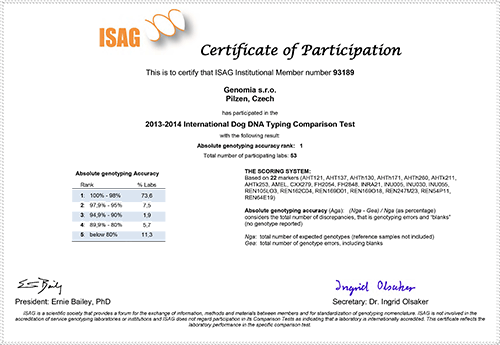
Testing of dogs: Genetic profile DNA (ISAG2006)
Related tests
- 4-test for Australian Labradoodle ALAEU members can apply 10% discount
- 6-test for Australian Labradoodle ALAEU members can apply 10% discount
- DNA profile of the dog - combination of STR (ISAG2006) and SNP (ISAG2020)
- DSRA + DNA profile combination of DSRA and DNA profile tests for Cane Corso
- Lafora Epilepy + DNA profile ISAG2006
Determination of dog genetic profile
For testing a genetic profile blood samples are preferred. The analysis is very sensitive to DNA-quality. Swab samples can be used, but the swabs must be done correctly. If new samples have to be taken due to bad quality of a swab, the laboratory shall charge the costs of the repeated analysis to the customer.
.
Why should you want the genetic profile of your dog?
Determination of a genetic profile means identification of a set of markers that are characteristic and unmistakable for a given individual (for example as a fingerprint). Each individual can be unambiguously identified according to the genetic profile. If you know the genetic profile of your dog, it can be used in the following cases:
1) Loss, theft
The genetic profile enables to prove the identity of an individual, if the dog gets lost or stolen.
2) Lifelong identification
If a microchip that your dog is wearing fails and becomes unable to be detected, the dog´s identity can be proven and the dog can be microchipped once again.
3) Paternity verification
The genetic profile is needed for testing the relationship of individuals, particularly for the paternity verification.
4) Insemination
Determination of the genetic profile is usually required for breeding dogs whose seminal fluid is stored and used for insemination. The genetic profile identifies the sperm and can be used for verification of the paternity.
5) Verification „clear after parents"
In breeds burdened with a specific recessive genetic disease the selected parents are tested for presence of this disease. If the parents are healthy, so there is 100% chance that the offsprings will be healthy, too (the likelihood of de novo mutation occurrence is hundredth of a percent).
Sometimes the new owners of a puppy wish to prove that the chosen puppy is free of any risk of specific genetic disorder. This can be proven either by direct testing for the genetic disease in question or by paternity proof - proving that the puppy is an offspring of the parents declared free of this genetic disease.
We recommend proving the paternity for puppies that are declared "clear after parents" or „normal after parents". It is prevention against possible swindles or irresponsible breeding practices.
6) Selection of optimal breeding pair
When optimal breeding pair is chosen, a series of traits such as character, appearance, health condition... are assessed. The genetic profile can be used as another tool that can the breeder help to make a final decision. If you want to add new blood in your breeding stock, it is useful to compare the genetic profiles of the potential parents. It is required that the breeding pair is heterozygous (different) as much as possible with regard to the markers compared. In general, the more different markers the individuals are wearing, the lesser they are genetically similar.
The comparison of genetic profiles of breeding individuals is a possibility how to maximize the genetic diversity within the breed and maintain the required physical and psychological properties.
.
What exactly genetic profile is?
The determination of genetic profile means determination of a set of genetic markers that are characteristic and unmistakable for the given individual (such as, for example, fingerprints of people). On the basis of a genetic profile, a dog can be uniquely identified.
To determine the genetic profile, tandem repetitive sequences (STR) are used. These sequences, also called microsatellites, are a class of genetic markers consisting of tandem sequence repeats with a size of two to seven base pairs. The alleles of STR locus change according to the number of repeats of the given sequence motive. Due to high level of polymorphism (informativity) and Mendelian inheritance, the microsattelites became suitable genetic markers for the study of diversity, parentage tests and the genetic identity.
STR alleles are determined by means of multiplex polymerase chain reaction (multiplex PCR). One of the primers of each pair is at 5´-end labelled with a fluorescent dye. Fragments are divided and detected in only one electrophoretic probe using an automatic electrophoresis device.
With regard to profile testing, two main approaches are possible:
- Markers according to ISAG - International Society of Animal Genetics
- Markers according to AKC - American Kennel Club
These two approaches differ completely in the markers determined and their results are not mutually compatible. For example: if the genetic profile of one of the parents is determined according to AKC and the genetic profile of the offspring according to ISAG, it will not be possible to determine the parentage by comparing the results. On the contrary, if the genetic profiles of both dogs (parent and offspring) are determined according the same principle, the paternity can be determined by comparing the results without making further analysis.
The ISAG-method is more common in Europe and recommended by FCI and determines more markers than AKC-method. The AKC-method is recommended in the USA.
.
Genomia is an ISAG member
Genomia regularly participates in comparative quality tests, that are every two years held by ISAG (International Society for Animal Genetics). Here, you can see latest certificate of quality, where Genomia was successful in 2022, 2020, 2018, 2016 as well as in 2014 in 100% of all the determined markers of canine DNA profile:-)
.
.
.
.
.
The laboratory guarantees determination of at least 17 from the following 22 markers: AHTk211, CXX279, REN169O18, INU055, REN54P11, INRA21, AHT137, REN169D01, AHTh260, AHTk253, INU005, INU030, Amelogenin, FH2848, AHT121, FH2054, REN162C04 AHTh171, REN247M23, AHTH130, REN105L03, REN64E19. These markers are included in the recommended panel according to the International Society for Animal Genetics (ISAG).




